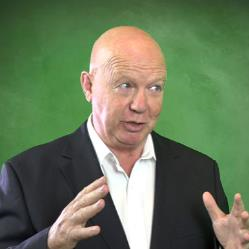"Language is key to achieving a high performance culture change" - Interview by John Smibert
 In an enlightening series of discussions with leadership guru Maria Nordstrom we have explored why it is important to transform to a high performance culture. We've explored the outstanding outcomes that can be achieved as a result and we've examined what we need to put in place to do so.
In an enlightening series of discussions with leadership guru Maria Nordstrom we have explored why it is important to transform to a high performance culture. We've explored the outstanding outcomes that can be achieved as a result and we've examined what we need to put in place to do so.
It means changing our behaviour from the top down.
But are we kidding ourselves - transforming our culture is not easy.
I've seen too many failures to make out that it's straightforward.
So in this discussion I asked Maria why is it so hard and what should we keep top of mind as we journey through such change.
View or read the full interview to get to learn more. This is likely to be valuable reading for CEO's, CSO's and Sales leaders. This is the seventh in a series of 10 interviews with Maria where we explore sales leadership and high performance cultures.
************
Maria Nordstrom, CEO of Basketball Aust and Managing Director of The Upside Group, is an executive coach, a specialist in sales leadership and a change leader focused on high performance sales cultures.
Subscribe to future videos See previous 'TALKING SALES' videos here
Interview
John: Hello, I'm delighted again to have Maria Nordstrom with me - welcome back, Maria!
Maria: Thank you, John - it's a pleasure to be here! [laughter]
John: I love your smile! [laughs] Hey, we've had lots of discussions about how to change a high-performance culture.
Maria: Yes, we have.
John: But it's tough, it's tough.
Maria: It is really tough. One thing is to set out on the strategy that you want to create this and what it looks like for your organisation, but two is to be consistent, not only your own leadership but all leadership within the organisation and being consistent and congruent with that, and that's the big challenge.

John: Yes. So, understanding this and understanding that people fall back to old habits, what are some of the recommendations you've got for sales leaders and leadership groups to consistently drive that cultural change? Because it's a journey, as we've previously talked about, it's going to take months or years; it's not something that's going to happen overnight. How do we stop reverting?
Maria: One key thing is the language. When you're at the end of the month, end of the quarter, end of the financial year, it's very easy to revert back to the language of "Push, push, push," to actually achieve the numbers, which is fine, but I think it's very key that you work with a language that is constructive and doesn't revert back to that kind of "Push, push, push at all cost," language. It doesn't mean that you don't push, it just means that the language needs to be congruent with what you are trying to achieve.
John: It reminds me of a discussion I had with Dean Kelly in this Talking Sales series. He really talked about the old language of getting towards the end of the month... "Where are your deals? How big are they? When are they going to close?" is not the right language for sales leaders to have.
Maria: Yes, absolutely. And I think if you've managed that pipeline and those expectations consistently across the whole sales period, you will not have those surprises at the end. However, I know from experience it doesn't matter what you do, you still have parents that want more or a parent company that wants more than you can deliver, and there are times when that is going to happen. One thing as a sales leader, even if you're a sales director or a sales manager, that is very key that you manage that. Because you can only achieve what you can achieve, provided the pipeline is healthy, that you're actually doing all the right things to bring input into the pipeline, your sales calls, driving those sales calls to take you through to the end of getting an order. Now, if you have a gap in the pipeline, that's a different problem which has nothing to do with the fact that you've got a problem at the end of the sales period.
John: Yes, and by roaring in and saying, "How are we going to close the deals by the end of the month?" aren't going to solve that problem. They're just make it worse, aren't they?
Maria: Absolutely, absolutely. So I think the consistency of language, the consistency across the whole organisation of language, and actually the communication also in writing, so "This is how you basically talk to one another or as a group but also how you communicate in emails, how you communicate when you actually do presentations." If there is consistency across the organisation in doing that and deliver, that's one of the key points so you don't lose it.
John: So what do you do when you see the wrong language being used throughout your organisation? As a leader you obviously have to pull people up on that.
Maria: Absolutely, and I think it's really key that when you have a group of people that work together as a group of leaders across the whole organisation, that people feel that they have or are empowered enough to do that, to remind people... not being confrontational, but "Hey, hey. I know we're all under pressure, mate, but we need to really pull ourselves in a bit, because this is going to cause more harm than good."

John: And talking about customer-centricity earlier, the language of the organisation tends to be about the customer, no matter what we're doing, right?
Maria: Absolutely.
John: So we can pull people up on that, let's just focus on the customer. And my experience, and talking about that discussion with Dean Kelly is that the sort of questions that you're going to ask is "What's the customer trying to achieve? What are their drivers? What process are they going through? How can we help them in that process?" They're the sorts of questions we can be asking the people in the field, rather than "Tell me about the deal. How big is it and when is it going to close?"
Maria: Absolutely. But that comes back to what I said earlier. You can't do that at the end of the month when you've got three days to deliver something, that is something that you need to do consistently. We talked about coaching earlier, and coaching is a language that you do consistently over time in every conversation.
John: Yes, and not revert under pressure.
Maria: Exactly, so that's one of the key things. And the other thing is in creating a high-performing culture, there is a bit of a perception that you kind of lose a bit of momentum and focus on sales. I think if you've used the right language, if you work consistently over the whole sales period - as we talked about, it's pipeline management, it's actually coaching conversations, it's really, truly understanding the customer, it's really understanding what value we add to the customer - if you're having those conversations across the whole sales organisation consistently, you are going to start achieving a high-performing sales culture.
John: And when people do revert, it'll be quite noticeable and people will be in a position to pull them up on it.
Maria: Yes. And the other thing is if you actually start the planning process, so they actually own the plan... It's not only saying that you basically have a two-million-dollar target and your team has a ten-million-dollar target, but sitting down on actually doing a plan, really, truly understanding the target market, "What are the customers that we can basically renew contracts with this year? What are the risks in doing that? What value do we add to them? What are the new customers that we want to target? How do we actually come up with a win strategy with them? What is the relationship with the current vendor? How do we work with that to overcome it?" and then really start looking at the people and the key training requirements that the team may have. Once they deliver that plan, that's the plan you managed them to, not the number.
John: Right, yes. And that will help change behaviour anyway, if doing that around the plan versus the numbers.
Maria: They own the plan, you use the language, it's a coaching language, and they've actually created that plan which you've agreed to at the end of the day and you work with them. That means that you have a level of accountability to something that they've actually owned from day one, and that's a big difference.
John: Spot on, love it - thanks very much, Maria!
Maria: Thank you!
****************
View a previous discussion with Maria here:
***************

Your Invitation: I invite you to join the Sales Leader Forum group on LinkedIn where you can experience informative discussions with your peers and sales thought leaders on subjects like the one we have discussed here. I also invite you to subscribe to the
- Sales Leader Resource Centre here
- Sales Leader YouTube channel here (300+ sales leadership videos)
Please Share: If you valued this article, please share via your Twitter, LinkedIn, Google+ and Facebook social media platforms. I encourage you to join the conversation or ask questions. So feel free to add a comment on this post - I promise to respond. If inclined please follow my LinkedIn post page here.
Want to touch base? If you have questions please feel free to contact me - email: john.smibert(at)salesleaderforums.com, Phone: +61 404857893 or Skype: john.smibert